NEFF Launches Commercial Landowners Climate-Smart Forestry Incentives Program
Our climate-smart forestry incentive program for commercial landowners is…

As 2024 comes to a close, we want to share highlights of the exciting work underway through NEFF’s Climate-Smart Commodities (CSC) project. The USDA Partnerships for Climate-Smart Commodities is a national program focused on expanding markets for America’s agriculture and forestry sectors by strengthening our rural economies and providing direct, meaningful benefits to landowners, producers and rural communities by leveraging the production of new climate-smart commodities.
Here in New England, this work centers on building partnerships with our commercial forest landowners, smaller family forest landowners, Tribal Nations, loggers, foresters and mass timber project developers and architects. NEFF’s CSC project is supporting the economic viability and competitiveness of the region’s forest economy by improving forest health and resilience, and increasing the carbon storage capacity of our vast woodlands. It is designed to expand markets for forest products in national and global markets while supporting critical ecosystem services—including clean air, clean water and robust biodiversity—by providing incentive payments to forest landowners and to the loggers and foresters who manage these lands across our rural communities.
Following are highlights of progress across the program one-and-a-half years into this five-year initiative. All of this work is based in deep and constructive partnerships, and NEFF would like to express our appreciation to all who are making this work possible now and in the years to come.
As we move forward into the year ahead, we will be focused on using this program to support production of high-value competitive products while supporting the long-term health, resilience and carbon storage capacity of our vast forestlands.
Through its Request for Proposals for Commercial Landowners in June, 2024 NEFF engaged six commercial landowners in Maine to carry out climate smart forestry practices with CSC incentives—Baskahegan Company, Clayton Lake Woodlands, Fallen Timber LLC, Maine Bureau of Parks and Lands, Robbins Lumber Company, and Seven Islands Land Company. In the next month or two, NEFF will be launching the second (and eventually third) RFP rounds, inviting additional commercial forest landowners to enroll in the program.
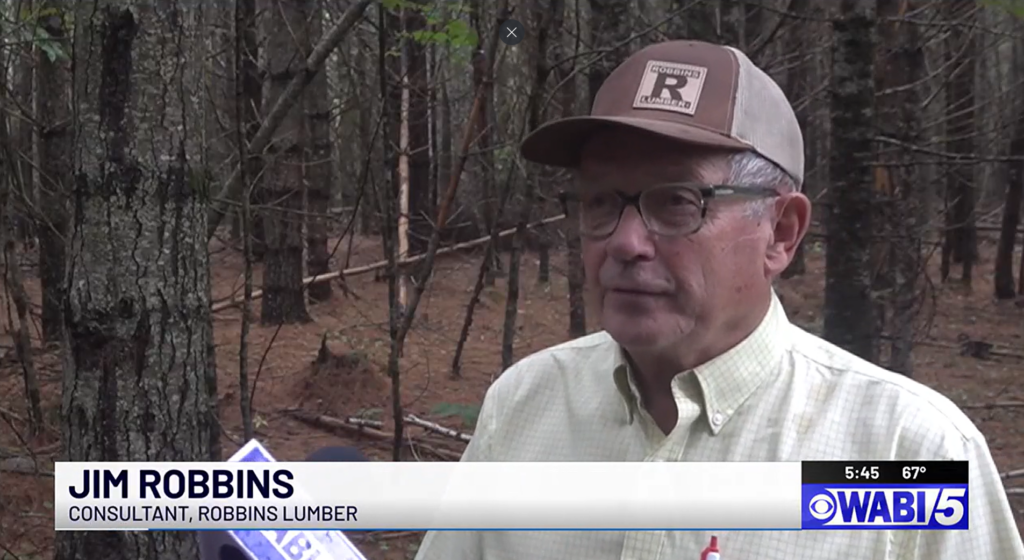
Jim Robbins of Robbins Lumber was interviewed by WABI TV5 in August 2024 when the first round of CSC grantee commercial landowners was announced | Credit: WABI TV5
Throughout the summer and fall we visited all these landowners, assessed and discussed forest conditions on their land base, and crafted individualized treatment plans. The companies are now in the process of completing the required environmental review so they can implement forest management treatments in 2025. These treatments will include pre- and early-commercial thinning and crop tree release in a range of spruce-fir, pine and northern hardwood stands. A full list of eligible treatments is available here. NEFF anticipates that treatments will begin in late winter-spring of 2025 and pick up momentum through the year.
NEFF has also initiated partnership with the Passamoquoddy Nation tribal forestry department in Maine to explore diverse treatments that would have climate benefit while meeting the Tribe’s forest management goals. Retention of “carbon legacy” trees during timber harvests has been chosen as a priority treatment for planned timber harvests.
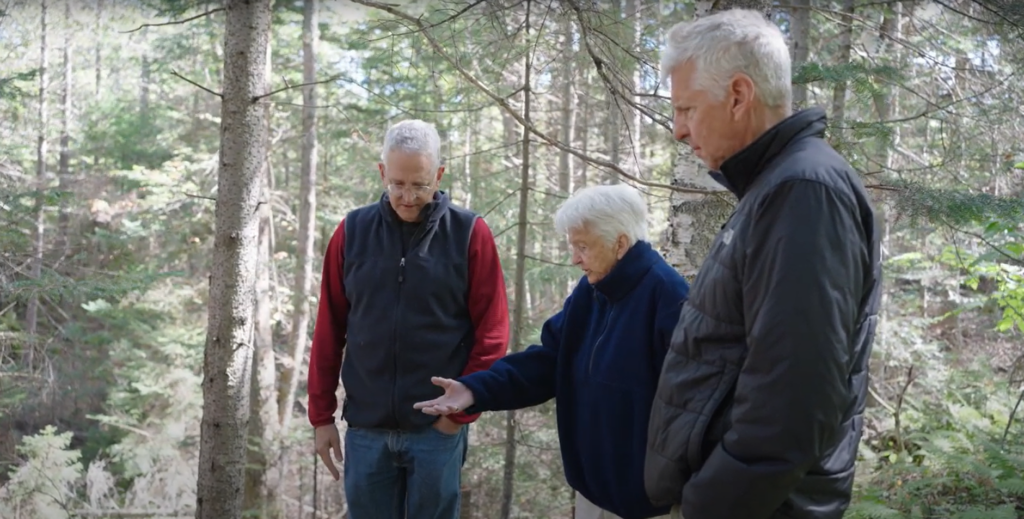
Tim Stout (left) of Northam Forest Carbon is a CSC project partner, private family landowner, and FFCP enrollee from Vermont | Credit: American Forest Foundation
NEFF is partnering with American Forest Foundation (AFF) to enroll landowners in Maine, New Hampshire, Vermont, and northwestern Massachusetts in AFF’s Family Forest Carbon Program (FFCP), partially funded in New England by NEFF’s USDA grant. At this time, the owners of approximately 3,200 acres have begun the process of enrolling via the FFCP as part of the NEFF grant.
NEFF launched the Grow Resilient Oak-Hickory (GROH) Forests program in early December, focused on serving smaller-acreage woodland owners in Connecticut, Massachusetts, and Rhode Island. Owners with at least 25 forested acres in CT and MA, and at least 10 acres in RI with an active forest management or stewardship plan are invited to fill out an application to determine their eligibility for an incentive that covers a portion of the cost to implement practices to promote forest health and climate adaptation on their woodland property. Forested land trust properties are also eligible to apply for practice cost-share funding.
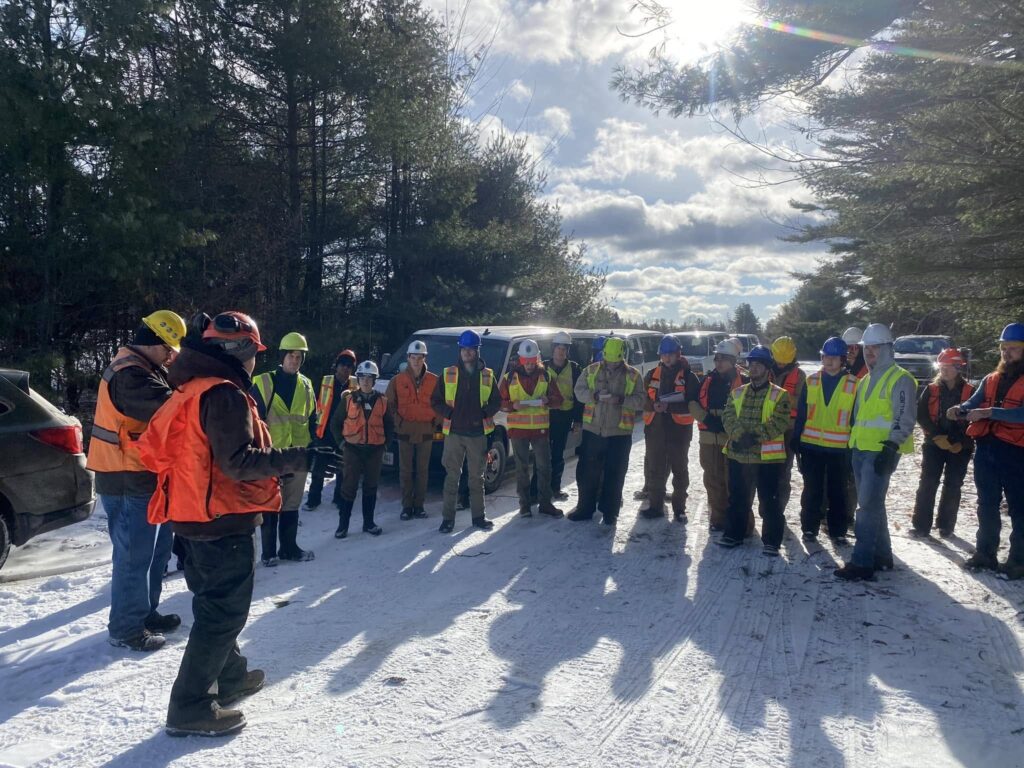
A Northeast Master Logger Certification training held in January 2024, organized by NEFF and TCNEF
In partnership with the Trust to Conserve Northeast Forestland (TCNEF), NEFF co-led four in-person workshops presenting Climate-Smart Logging practices to Master Logger certified companies. The workshops, which were held across Northern New England, included presentations from industry experts on technical logging topics designed to sharpen logger’s skills on implementing climate-smart logging techniques. Additional content focused on forest management policy and regulation, and using technologies like mobile mapping and data collection to help meet climate-smart logging goals. The workshops reached 100 logging operators from 70 different companies.
NEFF and TCNEF are close to completing the design of a logger incentive program which identifies forest stands that could benefit from climate-smart management but are uneconomic to harvest. Loggers will be able to apply for funding to harvest stands with approved climate smart harvest plans. NEFF and TCNEF expect hundreds of acres to benefit from this innovative approach to ensuring forest stands remain resilient to climate change while also storing carbon from harvested trees in long-lived forest products.
To serve smaller-acreage woodland owners with oak-hickory forest types in Connecticut, Massachusetts, and Rhode Island, NEFF partnered with Great Mountain Forest and Yale-Myers Forest in Connecticut to host forester field trainings in October and December engaging 22 licensed foresters.
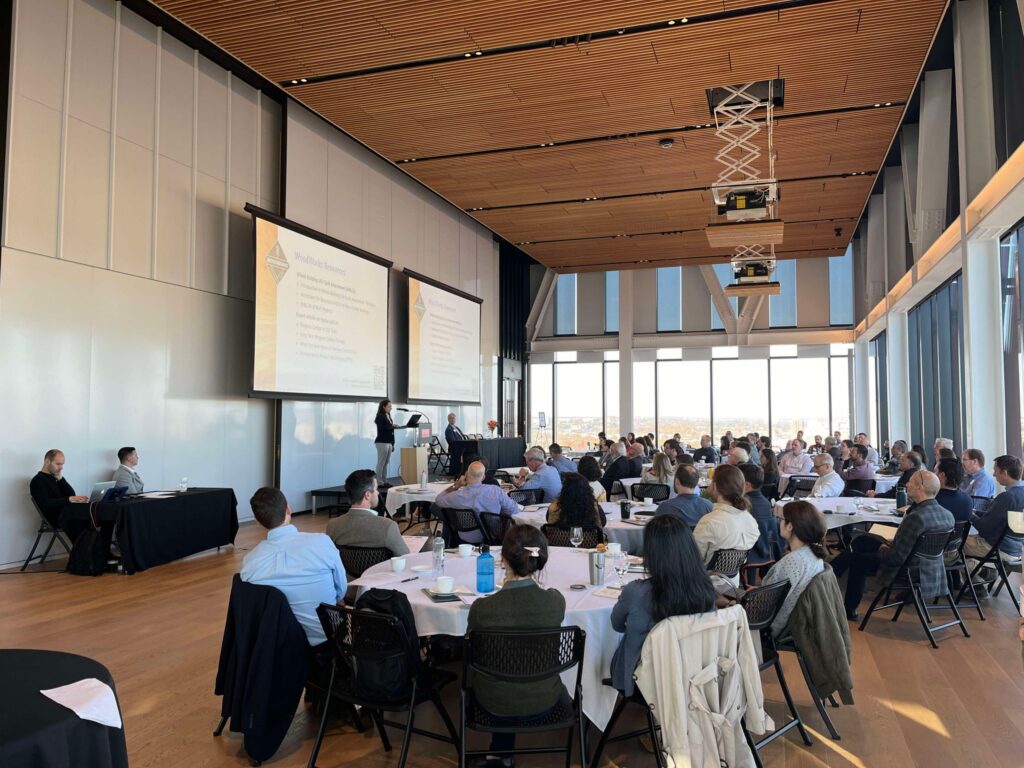
October 2024 CSC markets conference “Taking on Climate Change and Affordable Housing with Mass Timber,” hosted at Boston University and organized by Wood Works, photo by Vanessa Komada
Our market development work centers on the building sector (architecture, engineering, and construction), where wood products can satisfy the large and growing need for healthier, lower-carbon materials that are cost-competitive. NEFF staff and project partners are working to accelerate the adoption of mass timber construction in New England, especially for affordable housing, by demonstrating the need, the potential, and the best design strategies. We are developing tools and criteria to help connect the dots between this supply and demand. Work to date in this area includes:
To assess and quantify the impacts, outcomes and economics of the incentives provided under this program, NEFF has created a Measurement, Monitoring, Reporting, and Verification (MMRV) plan to (1) gather data on the state of forest stands before and after climate-smart forestry practices are implemented and (2) use forest growth and yield models to estimate the benefits of the practices on timber production, greenhouse gas benefits, and forest adaptation to climate change. At this point, NEFF is working with partners to define inventory and modeling protocols to address the climate and forest product benefits of CSC practices while also testing and improving the existing growth and yield models for the region.
GROH Forests’ impact extends to financial and community benefits. It supports the people and businesses that own, manage and depend on the region’s forestlands and forest sector. NEFF’s Climate-Smart Commodities work integrates climate resilience, carbon storage and the ecological health of our forests, while continuing to provide essential wood products and critical ecosystem services like clean air, clean water and diverse wildlife habitat.
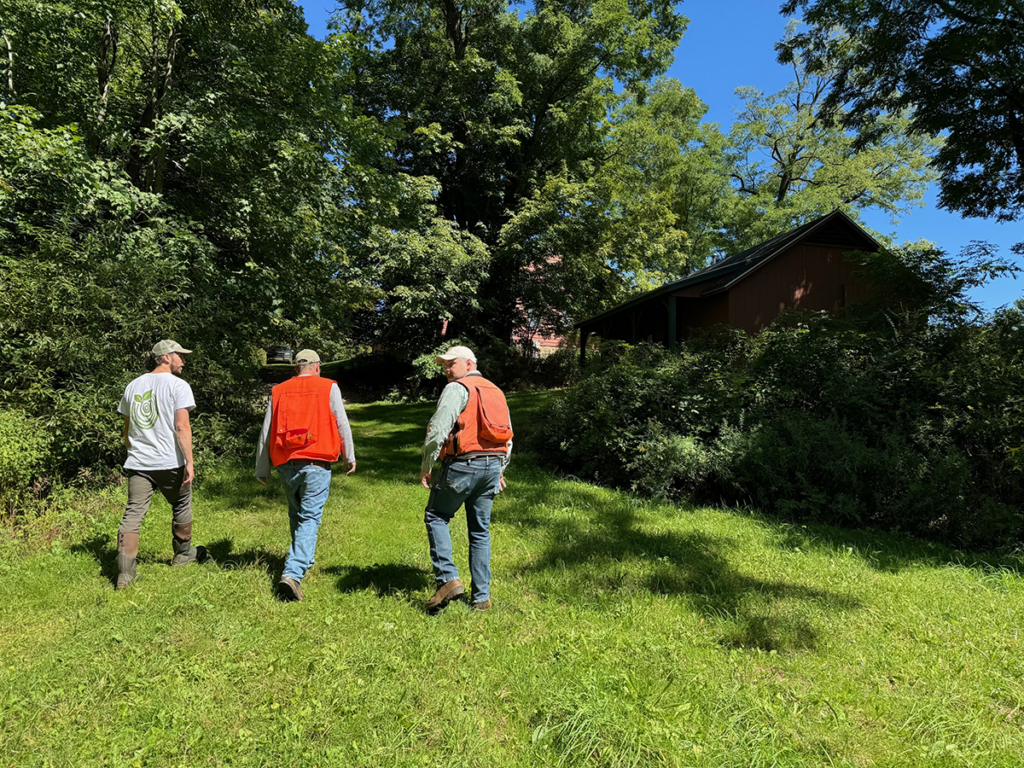
A forester training at Great Mountain Forest, photo by Lisa Hayden
NEFF is excited to announce that the 6,300-acre Great Mountain Forest (GMF) in Norfolk, CT, will enroll some of its lands in GROH Forests as the program’s first participant, and will serve as a flagship education, demonstration, and research site for the program. GMF is a nonprofit dedicated to helping communities derive more benefits from their forests while promoting biodiversity and ecosystem resilience.
The Northern Institute of Applied Climate Science has developed a climate-smart forestry curriculum NEFF has paired with in-the-field trainings thus far held at Great Mountain Forest and Yale-Myers Forest. These trainings give foresters in-person experience with the types of stands the GROH Forests program aims to manage, and examples of what these stands should look like post-treatment.
GMF co-hosted the first of the GROH Forests’ small-group forester training programs in October, featuring a day-long workshop and field training. NEFF and GMF are planning a series of educational forums in 2025–2026 including woods walks and workshops for family forest owners.